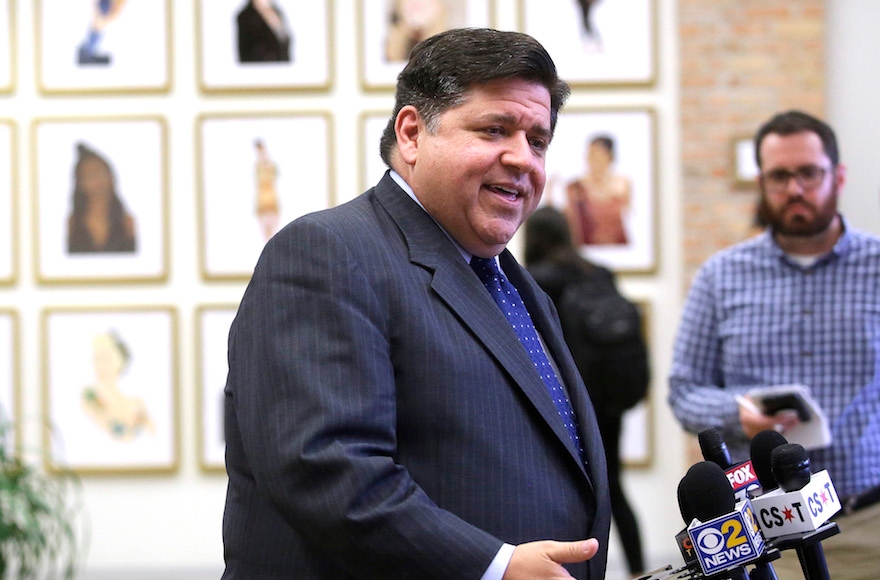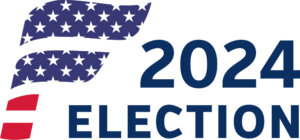J.B. Pritzker was vetted for VP. Now the Jewish governor of Illinois is playing host to Kamala Harris’ convention.
While Pritzker’s name is now associated with his wealth, he has cited his antecedents’ impoverished Jewish immigrant roots to explain how his politics are shaped

J.B. Pritzker shown Oct. 1, 2018 at an event in Chicago. He will be the next governor of Illinois. (Joshua Lott/Getty Images)
(JTA) — As Kamala Harris’ presidential campaign has gained momentum, the chatter surrounding a certain Jewish governor has only grown. At first, this rising Democratic star was thought of as a top-tier contender in Harris’ veepstakes. Now, his fans are anticipating what he’ll say from the stage of the Democratic National Convention, and what role he may play as a campaign surrogate in Harris’ quest to defeat Donald Trump.
 His name, of course, is J.B. Pritzker.
His name, of course, is J.B. Pritzker.
Pritzker, the Illinois governor now in his second term, is in the spotlight as Chicago hosts the Democratic convention. Like Pennsylvania Gov. Josh Shapiro, Pritzker, 59, was thought to be under consideration as Harris’ running mate. Unlike Shapiro, whose vice-presidential vetting was beset by debate over Israel and antisemitism, Pritzker was never a finalist for the ticket and has sashayed into the DNC without controversy.
Now, he’s playing host to thousands of Democratic delegates and is due to address the convention from the main stage later this week. He’s already spoken to attendees at smaller venues, cracking jokes about his family’s heritage and riches, and turning sincere about the Pritzkers’ immigrant story.
“The Democratic Party was not crying out for white Ukrainian American Jewish billionaires,” Pritzker said in a speech Monday morning, on the first day of the convention, alluding to the wealth his family has made in the hotel industry. “I get it.”
Pritzker was referencing onetime skepticism among Democrats that he could get elected governor of Illinois. A scion of the clan that owned the Hyatt Hotels chain, Pritzker earned a law degree and made billions as a venture capitalist.
His family has also long been involved in Democratic politics, which once sparked a sibling rivalry: He co-chaired Hillary Clinton’s 2008 presidential campaign, while his sister Penny was a major donor to Barack Obama’s campaigns and served as Obama’s commerce secretary. (She is now Biden’s special envoy to help Ukraine’s war-torn economy recover.)
Pritzker ran for Congress unsuccessfully in 1998, and in 2018, made another run, this time for governor. In the primary, he faced Daniel Biss, another Jewish politician who was more aligned with the Democrats’ progressive wing.
Pritzker became embroiled in scandal during that campaign when tapes surfaced of him talking to the former Illinois Gov. Rod Blagojevich, a Democrat who was then imprisoned after being convicted of corruption charges, about filling the Senate seat vacated by Barack Obama. On the recording, Pritzker suggested the state’s Black secretary of state, as that “covers you on the African-American thing,” and called Rep. Jesse Jackson Jr. a “nightmare.” In another tape recording of a conversation with Blagojevich, Pritzker sought political office from the governor.
Still, Pritzker emerged victorious after the primary. (Biss went on to become the mayor of Evanston, a Chicago suburb that recently became the first city to approve reparations for Black residents.) That fall, Pritzker defeated incumbent Republican Gov. Bruce Rauner in a year that saw a wave of Democratic victories. He won reelection easily in 2022 and is rumored to be thinking about a third term.
While Pritzker’s name is now associated with his wealth, he has cited his antecedents’ impoverished Jewish immigrant roots to explain how his politics are shaped. He has credited HIAS, the Jewish refugee aid organization, for helping his family settle in the United States.
“But they arrived and then found out there were no jobs available in Clinton, Iowa,” Pritzker said on a podcast hosted by Democratic strategist David Axelrod, a former Barack Obama aide. “And so they said, ‘Well, where’s the nearest big city so we can go find a job?’ And they pointed toward Chicago and so they got back on the train and came to Chicago.”
Pritzker’s ancestors came from what is now Ukraine, something Pritzker has raised in the context of the Ukraine war there, such as when Illinois divested from Russia in December 2022.
“As the great-grandson of Ukrainian Jewish refugees, I stand firmly with the Ukrainian people and condemn Russian violence,” he said at the time. “This is an important step in demonstrating support for the people of Ukraine and in condemning the unlawful invasion and occupation of Ukraine by Russian forces.”
Pritzker (like all of the candidates who were considered in Harris’ veepstakes) has a record of supporting Israel. He was formerly on the national board of the American Israel Public Affairs Committee, and on Oct. 7, Pritzker condemned the Hamas attack on Israel and posted, “In Illinois and across America, the people of Israel are in our prayers.” He spoke at a pro-Israel rally in the days following the attack.
In February, he said he was “disappointed” with a Chicago resolution calling for a ceasefire in the Israel-Hamas war and said it “will have any actional impact on foreign policy of the United States or on the hostilities taking place in the Middle East.” Last month, anti-Israel protesters demonstrated outside his house.
Pritzker was seen as central to the effort to bring the DNC to Chicago, and ahead of the convention, he has touted his progressive record in his state, including enshrining LGBTQ+ protections and reproductive rights. As debate swirls around the campaign and his party, he’s projecting an upbeat mood.
“Here in the Prairie State we’ve made tremendous progress improving the lives of our residents and investing in working families and the most vulnerable among us,” he said in a video message. “We’re proud to have an opportunity to show off all we’ve accomplished and share it with you.”















